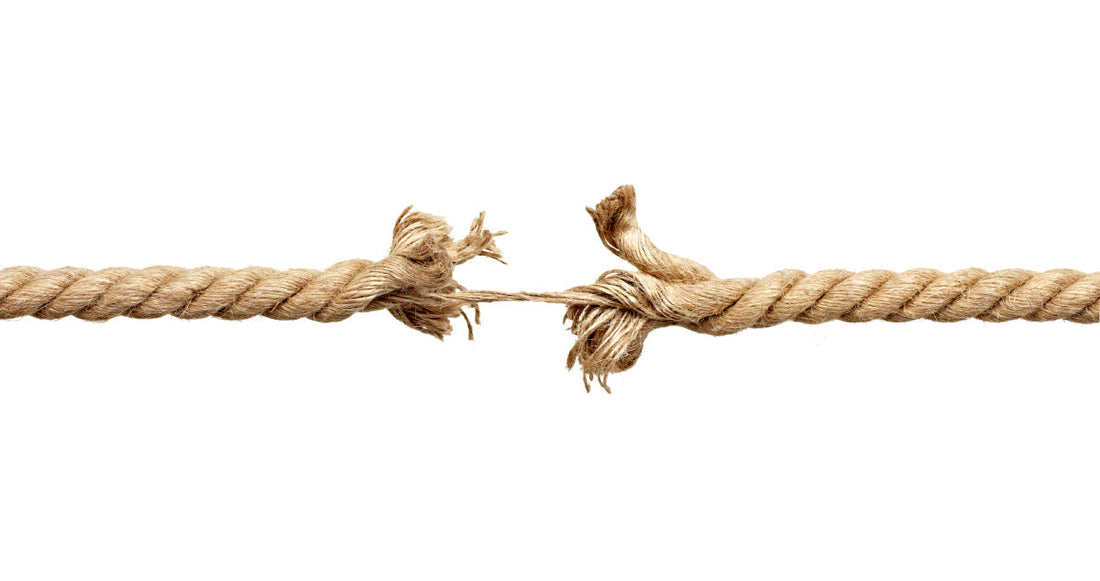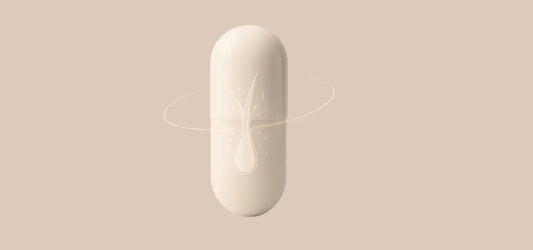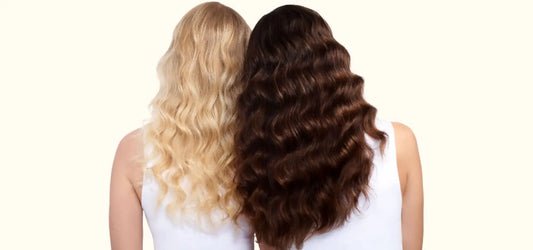How Different Types of Stress Affect Hair Loss

SHOP this article
OMI
Stress is a universal human experience. It can affect our health, our psychological coping mechanisms, even our hair. While genetics and hormones are a big part of the stress equation, research increasingly shows that the myriad types of the stress we experience exerts a powerful influence on hair health.
That’s because stress is not a single, uniform force but one that manifests in many forms, including psychological strain, oxidative stress from lifestyle habits, and chronic hormonal changes. Each of these types of stress can affect the hair follicle in different ways.
Drawing on scientific research, we’ll look at how stress disrupts the hair growth cycle, influences autoimmune conditions such as alopecia areata, and even leads to premature greying. We’ll also explore lifestyle practices that may help protect hair and restore balance in the face of life’s inevitable stressors.
The Most Common Causes of Hair Loss
Hair loss is not one condition but a spectrum of disorders with diverse causes and outcomes. Androgenetic alopecia, the most common form, is genetically driven and tied to hormonal sensitivity, specifically to androgens. Another common type of hair loss can occur after illness, surgery, or emotional trauma. Known as telogen effluvium, this can cause diffuse shedding a few months after a stressful event. Alopecia areata, an autoimmune condition, causes patchy hair loss and can progress to total loss in severe cases. Other forms include traction alopecia from tight hairstyles, anagen effluvium from chemotherapy or toxins, and scarring alopecia, which occurs when the hair follicles are permanently damaged.
What unites these is the impact of stress. Whether through immune disruption, inflammation, or direct hormonal effects, it consistently emerges as a key trigger and amplifier of hair loss.
Alopecia Areata and the Role of Emotional Stress
Alopecia areata (AA), an autoimmune condition in which the immune system mistakenly attacks hair follicles, is one of the most studied examples of stress-related hair loss. Research has shown that psychological stress often precedes flare-ups, with at least 23% of patients reporting a major emotional event or crisis before the onset of symptoms. Stress appears to weaken the immunity of hair follicles, making them vulnerable to attack.
Interestingly, alopecia areata can also occur in infants and newborns, suggesting that environmental factors beyond psychological stress, such as infections, toxins, and even dietary influences, may also be a contributing factor. Although the exact cause remains unknown, the estimated lifetime risk of alopecia areata is between 1.7% and 2.1%, making it a significant global health concern.
Oxidative Stress From Smoking and Alcohol Consumption
Stress is not just an emotional experience. Physical stress from chemicals or toxins can also exert a negative influence on hair health. Oxidative stress, caused by an excess of reactive oxygen molecules that overwhelm the body’s antioxidant defenses, has been strongly linked to hair loss. Lifestyle factors like smoking and drinking alcohol are two major sources of oxidative stress.
Studies show that smokers face a substantially higher risk of alopecia areata. Current smokers are nearly twice as likely to develop AA as non-smokers, and those with more than a decade of smoking history face even greater risks. Cigarette smoke generates free radicals that damage follicular cells, trigger chronic inflammation, and break down the immune protection around hair follicles. Smoking also disrupts immune balance, increasing the activity of inflammatory cells which can cause tissue damage. Alarmingly, secondhand smoke exposure also raises risks, particularly in children.
Alcohol also fuels oxidative stress, though its relationship with hair loss is more complex. Excessive alcohol intake impairs the immune system and stimulates histamines, which can lead to itching and inflammation. Alcohol also interferes with the body’s stress response system. While mild drinking may temporarily relieve stress, chronic consumption disrupts hormonal balance and increases long-term risks for conditions like alopecia areata.
How Chronic Stress Hormones Disrupt Hair Growth
Perhaps the most striking research into stress and hair loss centers on stress hormones—particularly cortisol in humans. Under conditions of chronic stress, cortisol levels rise and exert powerful effects on the hair cycle.
It does this by interrupting the normal hair growth cycle, which occurs in three phases: active growth (anagen), rest (telogen), and shedding. Elevated cortisol levels prolong the resting phase, preventing follicles from re-entering growth, leading to visible thinning, and shedding.
Chronic exposure to increased cortisol levels also weakens the structural integrity of hair follicles. It reduces production of essential extracellular components that help maintain follicle hydration and cycling. The result is fragile, poorly cycling follicles more vulnerable to hair loss.
Stress and Premature Greying
Not only does stress affect hair growth, it also influences hair color. Research shows that stress activates the sympathetic nervous system, releasing signals that permanently deplete melanocyte stem cells, which are responsible for producing pigment. Unlike HFSCs, once melanocyte stem cells are lost, they can’t regenerate. This means stress-induced premature greying is irreversible. The familiar experience of “going grey overnight” during times of extreme stress reflects this biological reality.
The Psychological Burden of Stress and Hair Loss
The relationship between stress and hair loss is cyclical. Stress can trigger shedding and thinning, while hair loss itself causes profound emotional distress, creating a feedback loop. Elevated levels of stress mediators disrupt follicular function, and patients often report losing hair after major life crises such as bereavement, divorce, or job loss. This psychological dimension underscores the importance of addressing mental health alongside physical treatments for hair loss.
A Breakthrough for Dormant Follicle Stem Cells
Still, there is good news on the horizon for stress-induced hair loss. A recent breakthrough found that stress hormones affect the hair cycle indirectly via a molecule known as “Gas6.” Under normal conditions, dermal papilla cells secrete Gas6, which activates hair follicle stem cells (HFSCs) and signals them to enter the growth phase.
When stress hormone levels are elevated, dermal papilla cells stop producing Gas6. Without it, HFSCs remain dormant, leaving follicles in a prolonged resting state. Importantly, these stem cells aren’t destroyed, they are simply inactive. Animal studies show that reintroducing Gas6 can reactivate the stem cells, kick-start hair growth, and even reverse stress-induced follicle dormancy.
This discovery offers hope: stress-related hair loss may be reversible through treatments that restore Gas6 signaling or counteract cortisol’s suppressive effects on hair follicles.
Lifestyle Tips to Protect Against Stress-Related Hair Loss
Although stress can't be eliminated, healthy lifestyle practices that encourage stress management can buffer its impact on hair. Regular exercise improves circulation and lowers oxidative stress. Yoga, meditation, and deep breathing reduce cortisol levels and rebalance the autonomic nervous system. Adequate sleep, seven to nine hours per night, supports tissue repair and stress hormone regulation. Creative outlets like journaling, hobbies, or mindfulness activities provide psychological relief.
Equally important is the avoidance of harmful habits such as smoking and excessive drinking, which worsen oxidative stress and immune dysfunction. Together, these practices can create an environment where hair follicles remain more resilient against stress-related damage.
The growing understanding of stress-related hair loss opens promising therapeutic avenues. Treatments that block the negative effects of increased cortisol levels on the follicle or enhance Gas6 signaling may one day restore normal cycling even under stress. Antioxidant therapies could neutralize free radical damage from smoking and alcohol. Meanwhile, psychological interventions such as cognitive behavioral therapy or mindfulness-based stress reduction could help prevent relapses in patients with alopecia areata.
Because hair follicle stem cells are not destroyed by stress but kept dormant, the potential to reactivate them represents an exciting frontier in hair restoration research.
The Takeaway
Stress is not merely an emotional burden, it’s a biological force that profoundly shapes hair growth, loss, and even pigmentation. Psychological stress contributes to autoimmune dysregulation in alopecia areata. Oxidative stress from smoking and alcohol directly damages follicles and fuels inflammation. Chronic cortisol exposure keeps hair follicle stem cells dormant, while stress-driven sympathetic activity permanently depletes pigment cells, causing premature greying.
Yet there is hope. Many stress-related changes in hair are reversible through lifestyle adjustments, stress management, and emerging therapies. Knowing what’s on the horizon and finding ways to cope with stress can help impart a sense of control.
Frequently Asked Questions
Can stress really cause permanent hair loss?
How long after stress does hair loss usually occur?
What can I do to prevent stress-related hair loss?
References
- 1. Minokawa Y, Sawada Y, Nakamura M. Lifestyle Factors Involved in the Pathogenesis of Alopecia Areata. Int J Mol Sci. 2022;23(3):1038. Published January 18, 2022. doi:10.3390/ijms23031038.
- 2. Harvard Stem Cell Institute. How chronic stress leads to hair loss. Published March 31, 2021. Accessed August 2025.
- 3. Arck PC, Handjiski B, Peters EM, et al. Stress and the hair growth cycle: Cortisol-induced hair growth disruption. J Drugs Dermatol. 2016;15(9):1001-1006.
- 4. National Institutes of Health. How stress causes hair loss. NIH Research Matters. Published April 13, 2020. Accessed August 2025.
- 5. Choi S, Zhang B, Ma S, et al. Corticosterone inhibits GAS6 to maintain hair follicle stem cell quiescence. Nature. 2021;592(7852):428-432. doi:10.1038/s41586-021-03314-6.
- 6. NYU Langone Health. Hair Loss: Types.
- 7. Frontiers in Medicine. Oxidative stress and alopecia areata. Front Med (Lausanne). 2023;10:1181572. doi:10.3389/fmed.2023.1181572.
- 8. Ahn DH, Kim H, Lee B, Hahm D-H. Psychological Stress-Induced Pathogenesis of Alopecia Areata: Autoimmune and Apoptotic Pathways. Int J Mol Sci. 2023;24(14):11711. doi:10.3390/ijms241411711.
- 9. Ulutaş SE, et al. Investigation of oxidative stress in patients with alopecia areata and its relationship with disease severity, duration, recurrence and pattern. Clin Exp Dermatol. 2015;40(6):617–621. doi:10.1111/ced.12556.
- 10. Antioxidants. Alopecia Areata: A Review of the Role of Oxidative Stress, Possible Biomarkers, and Treatment Options. Antioxidants (Basel). 2023;12(1):135. doi:10.3390/antiox12010135.
- 11. ScienceDaily. Regenerating hair follicle stem cells. Published March 31, 2021.
- 12. Nature. Relax to grow more hair. Nature. 2021.
- 13. Cureus. Malta IS, et al. Understanding the Association Between Mental Health and Hair Loss. Cureus. 2025;17(5):e84777. doi:10.7759/cureus.84777.
- 14. BMC Psychology. The relationship between physical activity levels and symptoms of mental health in individuals with Alopecia Areata. BMC Psychol. 2019;7:32. doi:10.1186/s40359-019-0324-x.
- 15. ScienceDirect. Psychological stress induces hair regenerative disorders through systemic neuroendocrine response. Biochem Biophys Res Commun. 2024.
- 16. ScienceDirect. Keep quiet how stress regulates hair follicle stem cells. Signal Transduct Target Ther. 2021.
- 17. JAAD. Psychosocial and psychiatric comorbidities and health-related quality of life in alopecia areata. J Am Acad Dermatol.









